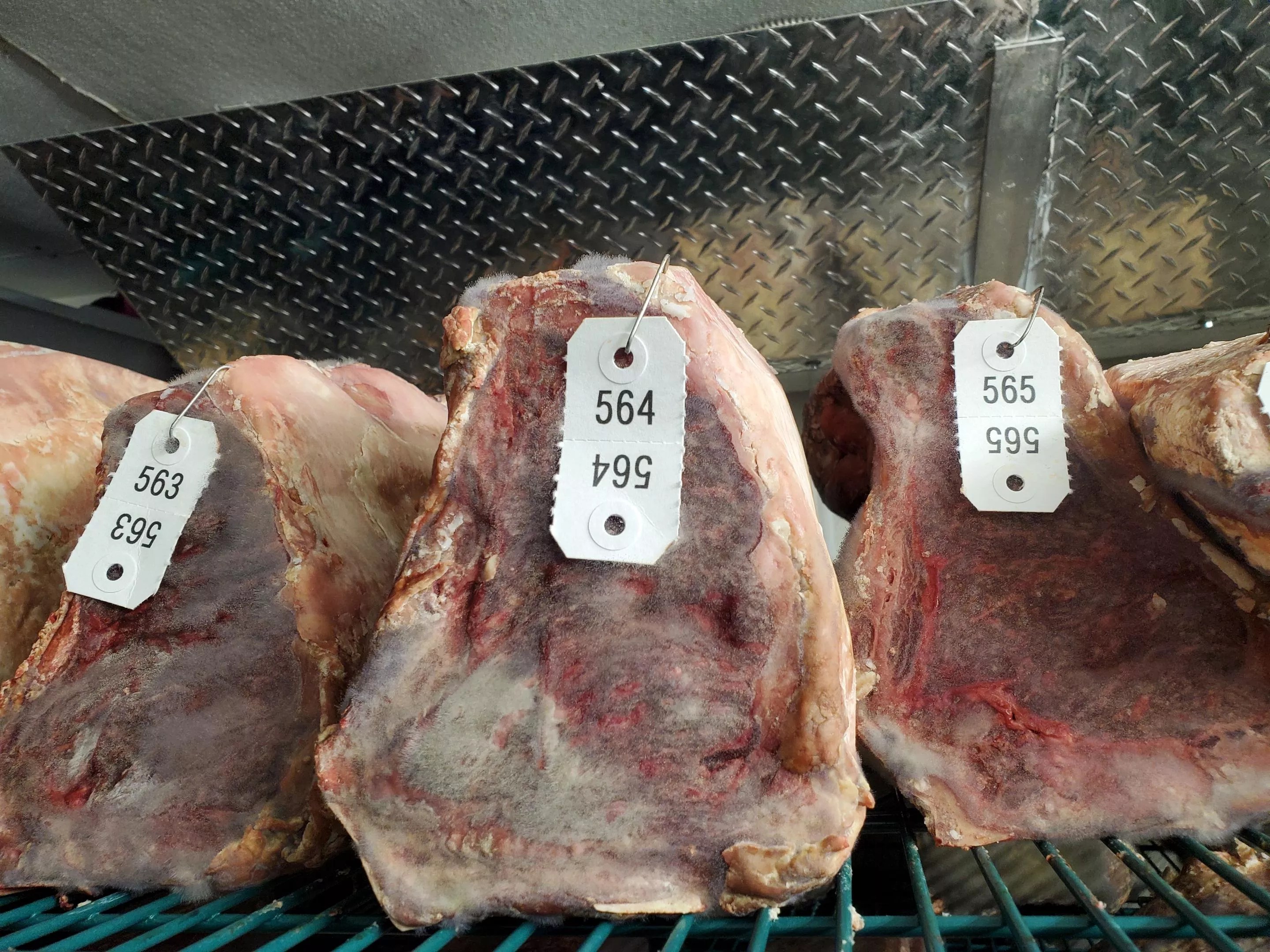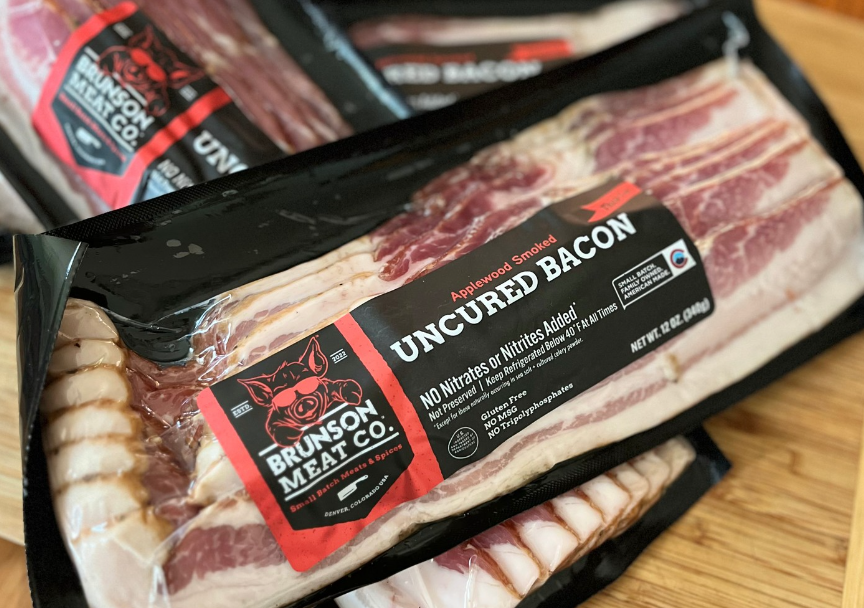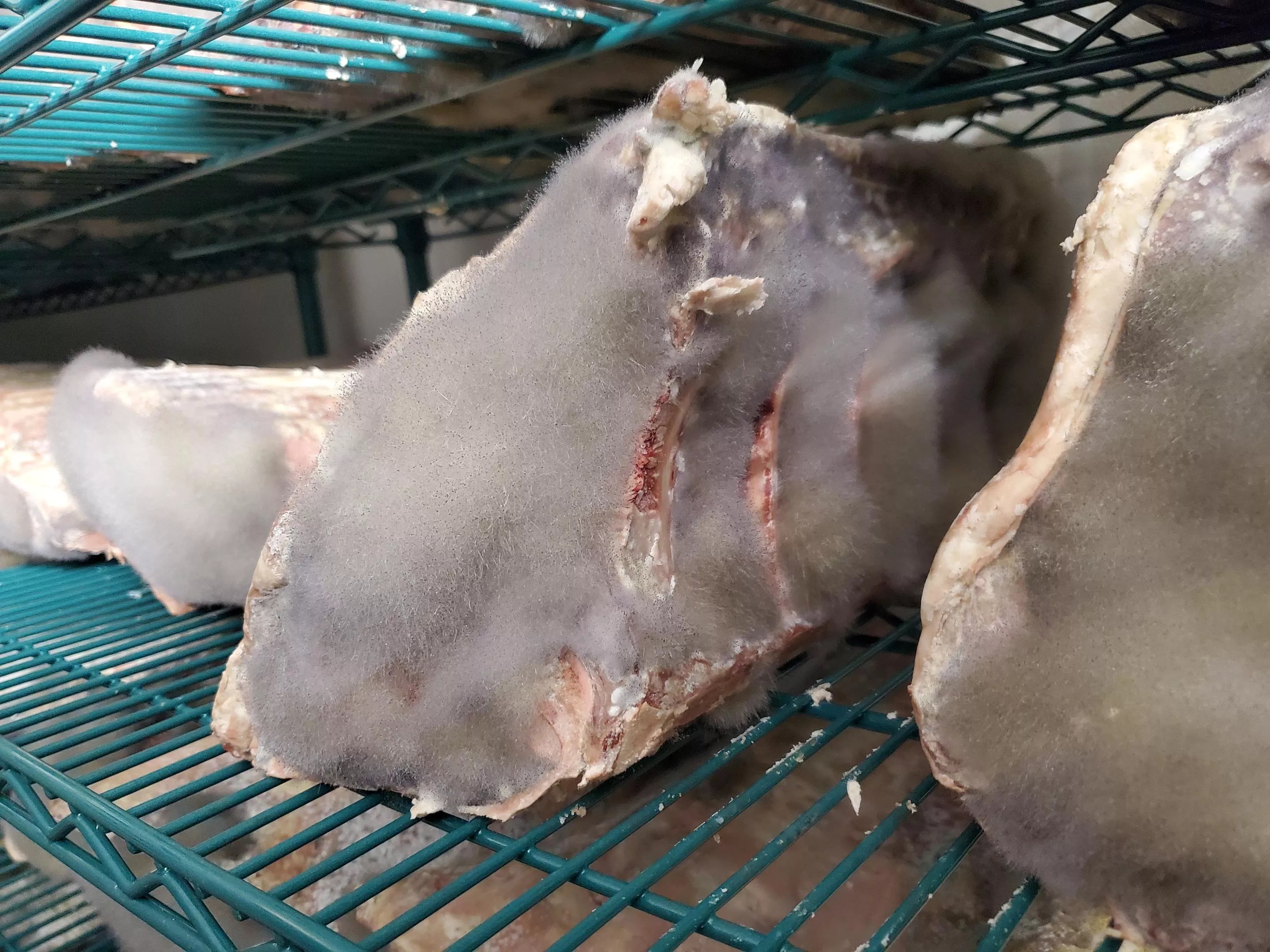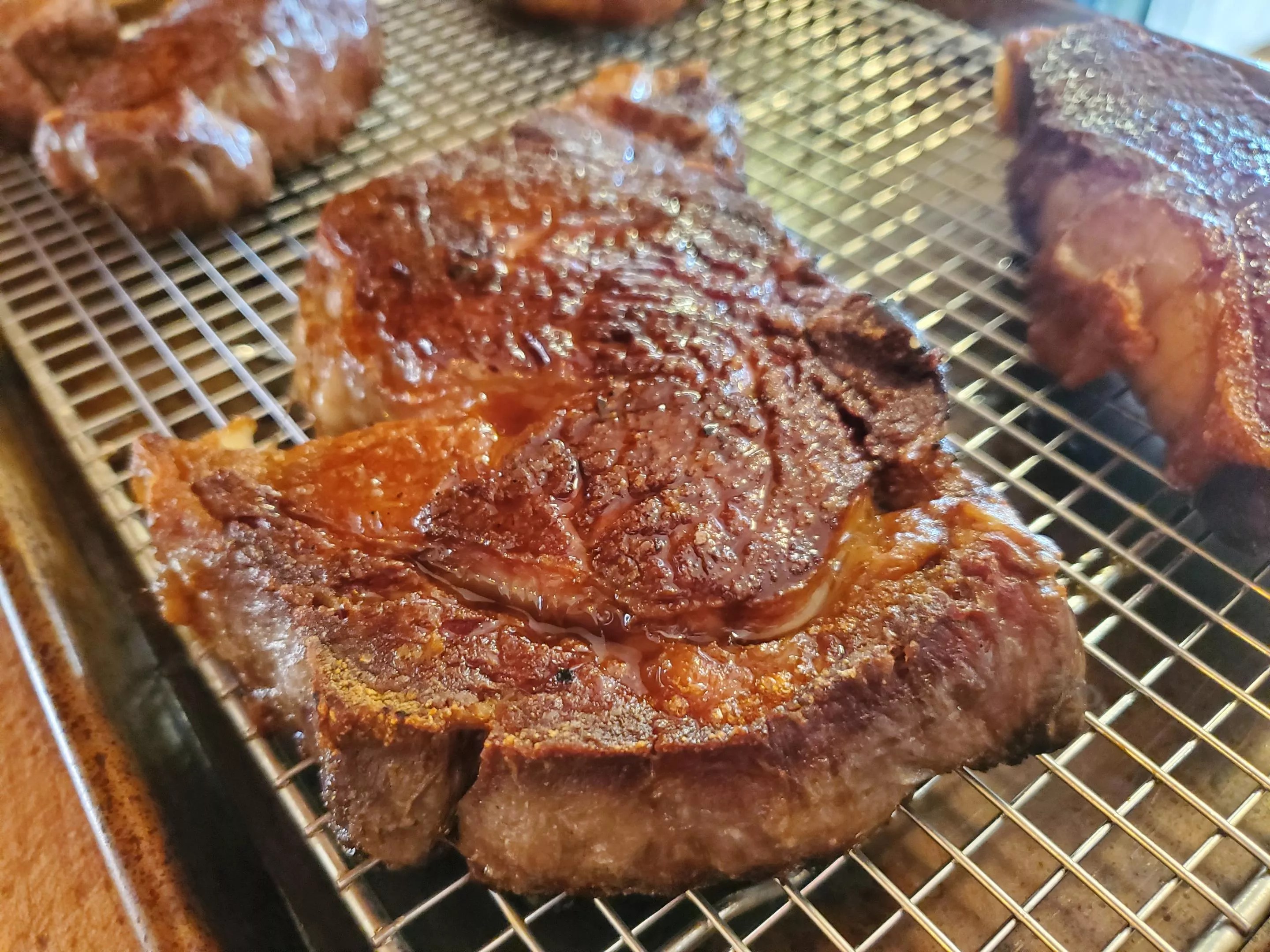
Molly Martin

Audio By Carbonatix
“This mold is crazy,” says Justin Brunson as he opens the door to a refrigerated room at Meat Cleaver, a wild game and beef processor near the Berkeley neighborhood that’s been in business since 1976. Inside, the temperature is chilly and the air smells like popcorn, with heavy nutty, funky notes.
The shelves are lined with cuts of beef in varying stages of dry-aging. But unlike most dry-aged beef, this meat is covered with mold – some of it so thick and fuzzy that you can barely tell there’s beef underneath.
“It’s like a cheese-aging cellar, but it’s my beef-aging cellar. Everybody that comes in here is like, ‘What the fuck are you doing, Brunson!? This is like a total science experiment,'” says the former chef/owner of Masterpiece Deli and Old Major, a pork-centric restaurant that was open for seven years in LoHi before shuttering during the pandemic in 2020.
After that, Brunson turned his attention to another project, River Bear Meats, which he launched in 2019. But by the summer of 2022, he’d shifted gears once again, selling his stake in River Bear with plans to start fresh. “It was a perfect opportunity for me to make some money, to do my own thing, just work with myself and be my only investor,” he told Westword at the time. “Now I’m starting my own business – my first business where I’m my only partner, my only investor. I’m really stoked for that.”
Free from the daily grind of restaurant life, Brunson took his time launching Brunson Meat Co., balancing research and development work on the new business with focusing on his own physical and mental health after years in the industry. He spent time fishing, traveling, working out and, recently, getting married.

Brunson Meat Co. bacon can now be found at local markets.
Brunson Meat Co.
Meanwhile, Brunson Meat Co. rolled out its first product line: bacon. “It’s going great; we’ve just been rolling along like a little champ,” Brunson says. The product is now carried in several local restaurants, as well as grocery stores like Marczyk Fine Foods, Tony’s Market and Leevers Locavore. It’s also distributed through Royal Crest Dairy; he has hopes it will be stocked at larger grocery chains soon, too.
But Brunson has another kind of meat on his mind these days. Back at home, just a few minutes from Meat Cleaver, he heats several cast-iron pans on the stove and begins searing a variety of steaks. The aroma that fills the kitchen is unlike any other – popcorny, like the dry-aging room, with a buttery sweetness.
“Beef has always been a passion project for me,” he says. “I’ve always wanted to do this new style of dry-aged beef, and I just never had anywhere to do it before.” But then a neighbor introduced him to Lucas Watson, who became the owner of Meat Cleaver about four years ago. “Lucas and his family gave me the space to make my dream come true.”
Brunson began experimenting with different styles and breeds of prime Angus beef from farmers in Colorado, Kansas, Iowa and Nebraska. “I feel like the Angus that comes out of the Corn Belt is some of the best beef in America,” he says. He inoculates the meat with three strains of mold that were gifted to him by well-known Dallas chef John Tesar, and ages it for anywhere from thirty to 120 days – the longer, the funkier.
“It really increases the tenderness, the aroma and the flavor of the beef,” Brunson explains. “Our beef tastes like popcorn and brown butter.” While both this process and traditional dry-aging make the beef more tender, “ours, with all the mold, imparts this beautiful flavor,” he adds.

The mold strains impart a popcorn-like flavor.
Molly Martin
It’s a flavor that has caught the attention of local chefs: Brunson’s beef is now on the menu at Barolo, the new Hop Alley chef’s counter, Meat & Cheese Restaurant and Farm Shop in Aspen, and both Rootstalk and Radicato, the Breckenridge eateries owned by chef Matt Vawter, who is a 2024 James Beard semifinalist for Best Chef, Mountain Region.
“It’s awesome beef,” says Vawter. He, like the other chefs using the beef in their restaurants, prefers the less-aged cuts – around thirty days – because the more subtle funk appeals to a wider range of guests. “There’s a story behind it, it’s a superior product, and we’re excited to have it on the menu.”
Alex Seidel was one of the first to taste Brunson’s early mold-aging experiments and now has the beef on the menu at his restaurants, Fruition and Mercantile. “Knowing where he got the mold from and watching that whole process, the similarities between aging cheese. … I’ve been curious about it for a long time, and Justin took that to the next level,” he remarks. “It’s a flavor that you can’t reproduce. It just has a butteriness and earthiness to it that you don’t get in typical dry-aged steaks.”
Brunson recently got a big new account, Mastro’s, which will begin serving the meat at its steakhouse in Scottsdale, Arizona, and potentially at all of its 21 locations across the country. “I’m super excited for all the support we’ve had from great restaurants,” he says.
His passion project currently occupies three rooms at the Meat Cleaver facility that can hold around 15,000 pounds of beef – “which is small,” Brunson notes. “But we are growing very fast. I’m actually driving to Iowa to look at another room there, which would hold an additional 40,000 pounds.”
A more recent beef experiment is a potential game-changer on a large scale. “I aged a ten-and-a-half-year-old dairy cow,” Brunson says, “and it might have been one of the best steaks I’ve ever eaten.” That’s big praise from a guy who grew up on a farm in Iowa and has been cooking meat professionally for decades – and eating it even longer.

The former chef’s searing skills are still on point.
Molly Martin
After they stop producing milk, dairy cows are typically relegated to a future as fast-food burgers, and those companies aren’t paying farmers top dollar for that meat. By using the mold-aging method to produce a steak that can compete flavor-wise with much more costly Angus beef, Bruson sees the potential to help the industry as a whole. “I love the sustainability portion of it,” he explains. “To really extend the usage of a dairy cow and get the farmers more money for their hard work – to me, that’s a dream come true. … Instead of all those animals going to McDonald’s and Burger King and the farmers getting pennies on the dollar, we can do something really amazing with that.”
Plus, he adds, “It’s just one of the neatest things I’ve ever eaten. It was one of the most unique steaks I’ve ever had in my life. It’s super rich, super beefy, super tender. I didn’t expect it to be so great – I’ve never eaten an old cow like that. You wouldn’t think it would be so amazing.”
The dairy cow is one of the steaks that Brunson sears, then rests on a wooden board in his kitchen before slicing to reveal a lineup of perfectly mid-rare meat. With each bite, it becomes clear that this truly is a top-tier product with more depth of flavor than other dry-aged beef. There’s pork on the board, too, that’s also been dry-aged with the mold, another experiment that Brunson hopes will find a market. The process “really brings out the natural sweetness of the pork,” he says.

Molly Martin
Even after working with meat his entire career, Brunson is learning a lot with this new venture. “It’s so exciting. That’s my favorite thing about food: Just when you think you might know it all, you don’t know anything,” he says. “Learning about different styles of beef and creating something new – with the mold-aged beef, there’s nobody else that I know of doing that. It’s just so cool to be learning again.”
His next mission is to get the beef on the Brunson Meat Co. website for direct-to-consumer sales, so that he can begin shipping the product to beef lovers nationwide. “It’s exhausting driving around town selling steaks out of my car,” he jokes. “It’d be really nice if people could just get to the website and order their box of steaks and bacon for the house.”
While his new business is different from restaurant life, “it feels good,” he concludes. “I love working with food, especially meat. So I still get to play with meat and push and do something different. As with being a chef, you’re always trying to create the best dish or best version of something, and I feel like I’m doing that right now with the beef and with the bacon.”
For more information on Brunson Meat Co., visit brunsonmeats.com.